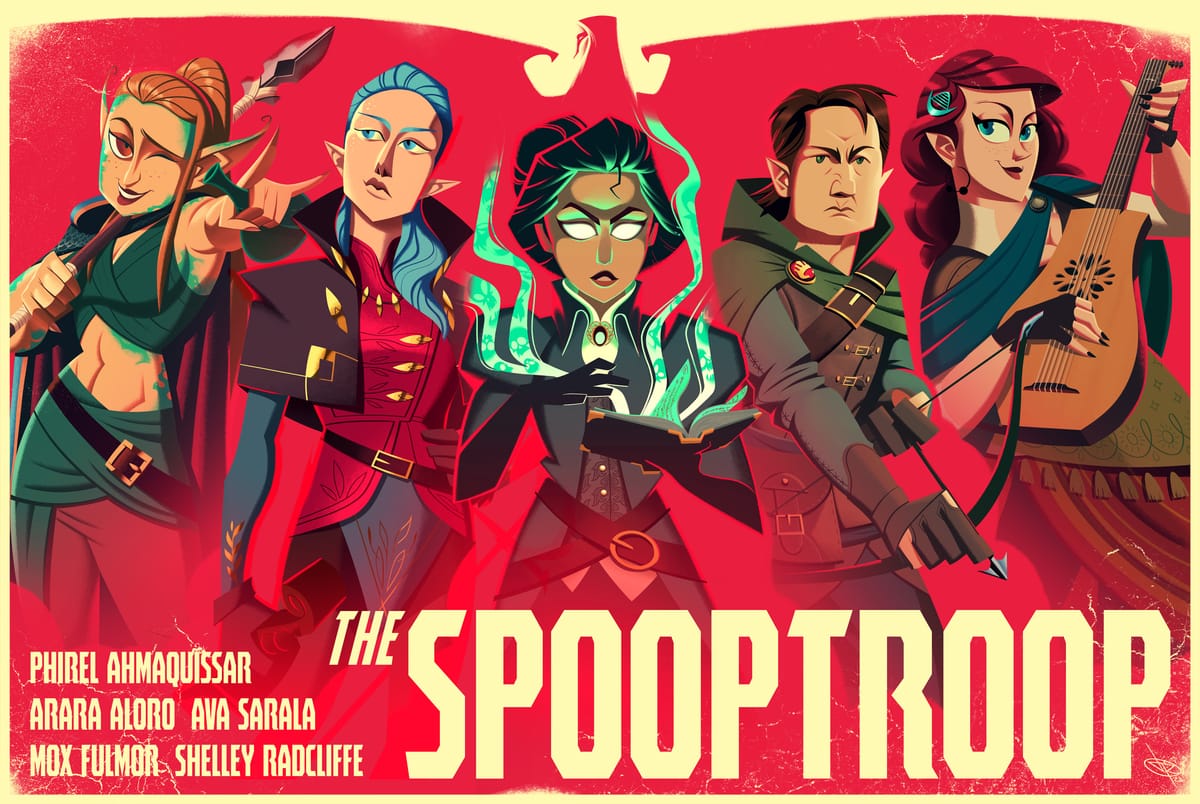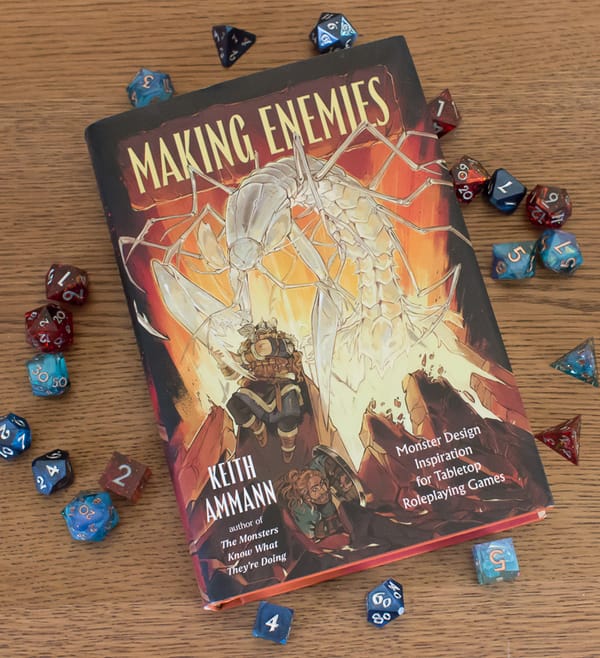An Elderly Lady Is Up to No Good, Part 2

(Read part 1 here.)
In my post “Fitting Through the Door,” I posited that porting a player character from one system to another requires being able to answer “yes” to three questions:
- Does the character’s “one main thing” make sense within this system and setting?
- Does the system faithfully reflect the rest of the character’s fundamentals—ability contour, combat role (if any) and constellation of skills?
- Can I tell the character’s story in this system and setting, and does their personality come through intact?
In theory, the 2014 and 2024 versions of fifth edition Dungeons & Dragons are one system, in which the refinements of 2024 exist to “take this thing that’s been fun and make it even better,” according to lead designer Jeremy Crawford in an interview with CBR. In practice, however, they’re different enough that it’s not always possible to faithfully re-create a PC created under 5E14 rules in 5E24. Garregwen, my wood elf Battle Master fighter, is an illustrative example. Ava Sarala, my wife’s Undying warlock, is another.
Jen sat down with the 2024 Player’s Handbook and tried to rebuild Ava at level 1 using the new character creation rules. The first thing she noticed was how much Ava’s broader fundamentals had changed. Specifically, instead of five skill proficiencies, Ava now had nine; instead of three cantrips, she had seven; and instead of two leveled spells to start, she had four. One tradeoff, however, was that Jen had to reduce both Ava’s Intelligence modifier and her Dexterity modifier. “It’s less well-balanced than I intended, and those are just too many skill proficiencies,” Jen said. “You only have a total of 18, and I literally have half of them filled in. That’s a lot to have filled in. … It’s not going to do me a whole lot of good without ability scores to back them up.”
Moreover, Jen suggested that 5E24’s changes to the Pact of the Tome—in particular, removing the ability to seek out and add new ritual spells—would likely detract from Ava’s in-game motivations.
I still don’t like how they handle the pacts, trying to roll it in like, this is just another Eldritch Invocation. It has less of a play difference at this point [level 1], but later in the game it will because it gives me no incentive to collect spells. … In the original Ava, there was a synergy between choosing Pact of the Tome and then choosing Eldritch Invocations that let me do things like see in the dark, [and] having the Undying patron who helped me not have to go to sleep, and then being able to hoard spells, to collect spells regardless of their class as long as they were rituals, gave me an incentive to put those things together, so that she could basically become a walking spellbook. … Having that plan laid out and feeling like I had something to work toward and coming out at the end of the game feeling like I had built a character significantly more powerful than I had at the beginning made [playing Ava] really enjoyable.
However, the more serious obstacle to re-creating Ava in 5E24 is that it’s no longer possible to faithfully reflect her “one main thing”—her relationship with her patron, the Kitab-e bi-Senn (“Book of the Ageless”)—or her story leading up to the meeting outside Daggerford that kicks off Curse of Strahd.
One conflict is the narrative that 5E24 imposes on the Book of Shadows that comes with Pact of the Tome. “Stitching together strands of shadow, you conjure forth a book in your hand at the end of a Short or Long Rest,” the PH24 prescribes. That’s a big departure from Ava’s backstory, to which the acquisition of the Kitab is so central. The first thing she does upon acquiring the magical tome that will give her her heart’s desire is … to immediately conjure another tome, all by herself? It’s handwaving—in a comically literal sense—the question of where she gets her warlock powers from. (In contrast, in our Curse of Strahd campaign, the Book of Shadows became part of the Kitab. But 5E14 clearly stated that the Book of Shadows was granted by the patron, not created by the warlock.) “It’s sort of like with the ranger and the spirit beast thing,” Jen said, referring to the 5E24 Beast Master’s Primal Companion feature, which replaced 5E14’s Ranger’s Companion. “I don’t want a fungible beast. I don’t want a fungible book. I want there to be a special book. I want a special animal. They’re special to me, and they’re real and not exchangeable with something else. It’s aesthetics, but they’re aesthetics that add something.”
The other, more serious conflict is one of sequence. Ava must already have made her pact with the Kitab by the start of Curse of Strahd; otherwise, she shows up at the initial meeting still looking 60-something, and her character’s biggest secret is blown from the get-go. (The PH24 semi-explicitly argues that by choosing the warlock class, Ava has already made that pact, although she doesn’t know exactly what entity she’s made the pact with: “The entity is a voice in the shadows, its identity unclear.” But Ava is cautious and shrewd. If she couldn’t identify whom or what she was making a deal with, she wouldn’t have made the deal—and if all warlock patrons operated the same way, she might never have become a warlock, or an adventurer, at all. The implausible presumption that warlocks will make deals for power with unknown entities and be content to wait until later to learn what strings are attached is a problem not just for Ava but for 5E24 warlocks in general; Ginny Di discusses it in her video “Warlocks Are Changing, and I Have Concerns.”) Plus, once Ava is trapped in Barovia, she’s in no longer in a position to purposefully search for something like the Kitab; she has more pressing concerns. The only way for her to acquire it at that point is to stumble upon it by chance, which diminishes her. And it’s an absurd contrivance to have her just happen to find it while she’s level 2.
“In my mind, she can’t really begin this story without having this relationship with her patron,” Jen maintained.
The story can’t really happen. It doesn’t make any sense. Because doing that just reduces the story down to the mechanics, but missing the story elements. … To be fair, [5E14] did not include any mechanics for a magically youthifying elderly lady. It’s not there. It’s an idea I had that I talked to you [about] and we made work within the framework of the game. So assuming I had conceived of this all, the same process, I would probably come to this point and talk to you about it, to decide if and how it could work.
Honestly, though, as a Dungeon Master who recalls being told by Jeremy Crawford, “If you hate the 2024 content, you don’t have to use it,” I’m strongly inclined to sidestep the reordered narrative of the 5E24 warlock class by sticking with the 5E14 level progression—and, in all likelihood, the entire 5E14 class. To make Ava work in 5E24, especially as a level 1 PC in Curse of Strahd, requires more than simply taking some liberties, as all DMs do; it requires one to reject outright what 5E24 tells us about warlocks.
A professor of mine once wrote:
Henry James proposed that we ask three apparently simple questions about a work of art when we wish to form a thoughtful critical view: “What is the artist trying to do? Does he do it? Was it worth doing?” Too often we make the mistake of assuming that we do not need to consider the first two questions when, in fact, they may be difficult even to separate, let alone to answer. (Sean Wilkinson, “Critical Observations”)
Having watched 5E24 take shape through many Unearthed Arcanas, and now seeing the shape it’s finally taken, I have my suspicions that the intentions publicly shared by the design team were not the only ones behind the design of 5E24. If we take those publicly shared intentions wholly at face value, however, I’m not sure we can say that the design team did what it set out to do—not if 5E24 precludes players from having joyous play experiences that 5E14 did allow them to have. It makes very definite assumptions about what D&D players are looking for in their game, but these assumptions aren’t always on the mark and are occasionally quite far off it.
In contrast, although the process wasn’t frictionless, I was able to faithfully import Ava into the Cypher System. Cypher doesn’t particularly care where she got her abilities from once it’s established in character creation that she has them. She’s an Adept? Great. No need to explain how that came about. (One could make the case that a character like Ava should perhaps be a Magic-flavored Speaker rather than an Adept, but the long-term buildout doesn’t work. Adept is fine, and simpler.)
I was going to homebrew a Manipulative descriptor, but it turned out that I didn’t need to: The existing Appealing descriptor covered all the bases. To suit Ava, all it needs is a different name and a bit of reframing (“You move people around like pieces on a chessboard, getting them to do what you want while thinking it’s their own idea”). The other characteristics of the descriptor work as written.
The challenging part of importing Ava into Cypher is the focus, capturing the essence of her “one main thing.” That one I did have to homebrew, but fortunately, Cypher has guidelines for doing so.
Pursues Immortality
You are a student of techniques for increasing longevity and restoring the bloom and vigor of youth.
- Tier 1: Extra Recovery
- Tier 2: Enhanced Potential
- Tier 3: Incredible Health or Poison Resistance
- Tier 4: Greater Enhanced Potential
- Tier 4: Hold Breath
- Tier 5: Not Dead Yet
- Tier 6: Final Defiance (Intellect) or Infuse Spirit
GM Intrusions: The fact that you don’t age is noticed and commented upon. In a moment of distraction or duress, you show your actual years.
This focus covers the aspects of Ava’s character relating to the pursuit of eternal youth and the gifts bestowed upon her by the Kitab. Her spellcasting is covered by her Adept type, and by the Cypher System’s optional Spellcasting rule (Cypher System Rulebook, chapter 13); if and when her patron chooses to yank on her puppet strings, it will do so through GM intrusions. The Pursues Immortality focus still needs adjustment around the middle tiers—I find myself wishing for another recovery-related ability, or maybe some offensive way of jamming the flow of another creature’s vital energy—but it’s a solid start. To bring it to the finish line, I might have to homebrew a few abilities as well, for example:
Who Needs Sleep: When you make your final recovery roll of the day, you can remain awake and alert for any or all of the ten hours you must rest. Enabler.
But, again, Cypher takes for granted that you will want to homebrew abilities from time to time, and the CSR provides guidelines for that as well.
Cypher has its pros and cons, but it strikes me as uniquely suited to absorbing characters created in other systems, because its type-descriptor-focus character creation system happens to handle all three of the questions I’ve posited. A PC’s “one main thing” is represented by their focus, their other fundamentals are handled by their type, and their personality and backstory are covered by their descriptor. These things may get thinned out a bit in the translation, but you can be sure they’ll come through enough that your PC will be recognizable as your PC.



